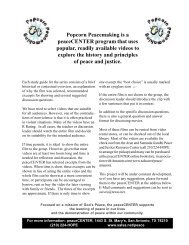LEO TOLSTOY Eleven Stories
LEO TOLSTOY Eleven Stories
LEO TOLSTOY Eleven Stories
Create successful ePaper yourself
Turn your PDF publications into a flip-book with our unique Google optimized e-Paper software.
Then they caught hold of the yoke, and spilt<br />
the water, snatched off one another’s shawls, and began<br />
fighting. Gabriel, returning from the fields, stopped to<br />
take his wife’s part. Out rushed Ivan and his son and<br />
joined in with the rest. Ivan was a strong fellow, he<br />
scattered the whole lot of them, and pulled a handful<br />
of hair out of Gabriel’s beard. People came to see what<br />
was the matter, and the fighters were separated with<br />
difficulty.<br />
That was how it all began.<br />
Gabriel wrapped the hair torn from his beard<br />
in a paper, and went to the District Court to have the<br />
law on Ivan. “I didn’t grow my beard,” said he, “for<br />
pockmarked Ivan to pull it out!” And his wife went<br />
bragging to the neighbors, saying they’d have Ivan<br />
condemned and sent to Siberia. And so the feud grew.<br />
The old man, from where he lay on the top of the<br />
oven, tried from the very first to persuade them to make<br />
peace, but they would not listen. He told them, “It’s<br />
a stupid thing you are after, children, picking quarrels<br />
about such a paltry matter. Just think! The whole thing<br />
began about an egg. The children may have taken it<br />
- well, what matter? What’s the value of one egg? God<br />
sends enough for all! And suppose your neighbor did<br />
say an unkind word - put it right; show her how to say<br />
a better one! If there has been a fight - well, such things<br />
will happen; we’re all sinners, but make it up, and let<br />
there be an end of it! If you nurse your anger it will be<br />
worse for you yourselves.”<br />
But the younger folk would not listen to the<br />
old man. They thought his words were mere senseless<br />
dotage. Ivan would not humble himself before his<br />
neighbor.<br />
“I never pulled his beard,” he said, “he pulled<br />
the hair out himself. But his son has burst all the<br />
fastenings on my shirt, and torn it...Look at it!”<br />
And Ivan also went to law. They were tried by<br />
the Justice of the Peace and by the District Court. While<br />
all this was going on, the coupling-pin of Gabriel’s cart<br />
disappeared. Gabriel’s womenfolk accused Ivan’s son<br />
of having taken it. They said: “We saw him in the night<br />
go past our window, towards the cart; and a neighbor<br />
says he saw him at the pub, offering the pin to the<br />
landlord.”<br />
So they went to law about that. And at home<br />
not a day passed without a quarrel or even a fight. The<br />
children, too, abused one another, having learnt to do<br />
so from their elders; and when the women happened<br />
to meet by the riverside, where they went to rinse the<br />
clothes, their arms did not do as much wringing as their<br />
tongues did nagging, and every word was a bad one.<br />
At first the peasants only slandered one another;<br />
but afterwards they began in real earnest to snatch<br />
anything that lay handy, and the children followed<br />
their example. Life became harder and harder for them.<br />
Ivan Stcherbakof and Limping Gabriel kept suing one<br />
another at the Village Assembly, and at the District<br />
Court, and before the Justice of the Peace until all the<br />
judges were tired of them. Now Gabriel got Ivan fined<br />
or imprisoned; then Ivan did as much to Gabriel; and<br />
the more they spited each other the angrier they grew<br />
- like dogs that attack one another and get more and<br />
more furious the longer they fight. You strike one dog<br />
from behind, and it thinks it’s the other dog biting him,<br />
and gets still fiercer. So these peasants: they went to law,<br />
and one or other of them was fined or locked up, but<br />
that only made them more and more angry with each<br />
other. “Wait a bit,” they said, “and I’ll make you pay for<br />
it.” And so it went on for six years. Only the old man<br />
lying on the top of the oven kept telling them again<br />
and again: “Children, what are you doing? Stop all this<br />
paying back; keep to your work, and don’t bear malice<br />
- it will be better for you. The more you bear malice, the<br />
worse it will be.”<br />
But they would not listen to him.<br />
In the seventh year, at a wedding, Ivan’s<br />
daughter-in-law held Gabriel up to shame, accusing<br />
him of having been caught horse stealing. Gabriel was<br />
tipsy, and unable to contain his anger, gave the woman<br />
such a blow that she was laid up for a week; and she<br />
was pregnant at the time. Ivan was delighted. He went<br />
to the magistrate to lodge a complaint. “Now I’ll get<br />
rid of my neighbor! He won’t escape imprisonment,<br />
or exile to Siberia.” But Ivan’s wish was not fulfilled.<br />
The magistrate dismissed the case. The woman was<br />
examined, but she was up and about and showed no<br />
sign of any injury. Then Ivan went to the Justice of<br />
the Peace, but he referred the business to the District<br />
Court. Ivan bestirred himself: treated the clerk and the<br />
Elder of the District Court to a gallon of liquor and got<br />
Gabriel condemned to be flogged. The sentence was<br />
read out to Gabriel by the clerk: “The Court decrees<br />
that the peasant Gabriel Gordeyef shall receive twenty<br />
lashes with a birch rod at the District Court.”<br />
33





